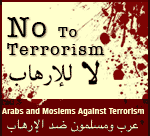
There is no god but God; Mohammad is the prophet of God.
And oh… Don’t forget to vote for Saad Hariri.

I used to strongly believe that the world would be a far better place without clerics, mullahs, bishops and priests. Yet an article by
Nicholas Kristof in the New York Times last year (you need a subscription to read it, but you can read it for free
here) let me re-examine this conviction.
Kristof, a staunch Liberal, argued that evangelists in Africa are doing most of the grunt work in combating AIDS, illiteracy and diseases. This is what he had to say:
I'm convinced that we should all celebrate the big evangelical push into Africa because the bottom line is that it will mean more orphanages, more schools and, above all, more clinics and hospitals. Particularly when AIDS is ravaging Africa, those church hospitals are lifesavers.
[…]
The evangelicals abroad are mostly pragmatists, not ideologues, so they should be a good influence on the Christian Right. While fundamentalists in America blindly oppose condom distribution, evangelicals in Africa see their friends dying of AIDS. They thunder against sexual immorality - but often hand out condoms.
As a blogger writing from Africa, I couldn’t but be touched by that logic, but I’m sure most of you are asking by now:
what does this have to do with Lebanon?For some strange reason, when I saw the council of Muslim scholars convening yesterday and asking the imams to support Hariri’s list, I remembered that article by Kristof.
To be clear from the beginning, I have always opposed the mingling of religion and politics. A blatant political affiliation by religious figures can only spell trouble. So why is Hariri courting them? But most importantly, why are they responding?
Pundits are already trying to answer: they say that Hariri’s reliance on the clerics means that he doesn’t have enough people on the ground to go out and vote. This is partly true. But to be honest, I think that this is just a small aspect of a much larger issue:
In the Arab and Muslim world, what should the ideal relationship between liberal (Muslim) rulers and Muslim clerics be?There are a lot of models around us: In Egypt, Syria and Turkey, the ruling class ruthlessly fought them, letting them accumulate resentment and become more extreme. In Saudi, they shared power with them, which made them impose a lot of excessive positions on Saudi officialdom. In Pakistan, they’re just ignoring them, also causing resentment…
In Lebanon, (and to a lesser extent, Jordan), the late Rafik Hariri was experimenting with a long term solution: Nurture and support the moderates by appointing them to high positions (Mufti Kabbani) and building them gargantuan mosques in the middle of the capital to show them that Islam still matters. But most importantly, build them schools, clinics and orphanages in the far-flung regions that the clerics themselves can run.
Just like those evangelists in Africa, Moslem clerics in remote areas of Akkar, Dinnieh and Bekaa are the closest you can get to a civil society. These are the people who run the schools and clinics, and these are the ones who have the greatest influence on the people’s political choices. So they might as well be moderates.
So in a very simplistic way, this is how it works: you build us mosques and schools, we let you chose the clerics who run them and we will vote for your liberal economic agenda, hell we’ll even vote for Sitrida Geagea. But in the issues we deem important (like civil marriage), you will have to side with us.
Buying them off? Maybe, but the alternatives are ugly.
When the Syrians used to control those areas, they terrorized the clerics into supporting the pro-Syrians because they know the extent of their influence. But now that the scarecrow is gone, the clerics are siding back with their natural allies: their financiers.
The other day, I met a lady in Tripoli who teaches in a school in Wadi Khaled, a remote region in the north of Akkar. “My students love Hariri, but let me tell you a secret: except for them, nobody knows that Hariri is the one who built this school”
Amr Hamzawy from the Carnegie Endowment for international peace wrote
this article in the Daily Star today: it explains how the “west” has recently moved from supporting Arab Liberals to supporting Moderate Islamists.
I have to tell him this: Sorry buddy, we invented this wheel before you.
(ps: you can read the first part, The Great Sunni Makeover,
here)

































